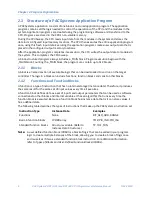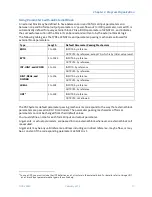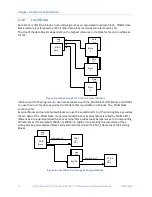
Chapter 2. Program Organization
GFK-2950C
February 2018
15
UDFB Logic
An instance of a BOOL parameter or internal variable can be forced ON or OFF, or used with
transition-detecting instructions. The exception to this is that BOOL input parameters passed by
reference cannot be forced or used with the Series 90-70 legacy transition-detecting instructions
(POSCOIL, NEGCOIL, POSCON and NEGCON) because their values are not stored in instance data.
All input parameters to a UDFB, and their corresponding instance data elements, can be read by the
logic of that particular UDFB.
Input parameters that are passed by reference or passed by value result to a UDFB can be written to
by their UDFB’s logic. Input parameters passed by value
cannot
be written to by their UDFB logic.
Note that the restriction on writing to input parameters passed by value does not apply to other
types of blocks.
All UDFB output parameters can be both read and written to by their logic.
UDFB Operation with Other Blocks
A UDFB instance that is of glo
bal scope can be invoked by another UDFB’s logic or any other block’s
logic.
A UDFB instance that is passed (by reference) as an argument to a UDFB can be invoked by the
UDFB’s logic.
A UDFB instance that is passed (by reference) as an argument to a parameterized block can be
invoked by the parameterized block’s logic.
The output parameters, and their corresponding instance data elements, of a UDFB instance that is
passed as an argument can be read but not modified by the receiving block’s logic. The inpu
t
parameters of a UDFB instance that is passed as an argument cannot be read or modified by the
receiving block’s logic. The internal variables of a UDFB instance that is passed as an argument
cannot be modified by the receiving block’s logic. They can be
read if their scope is global, but not if
their scope is local.
External Blocks
External blocks are developed using external development tools as well as the C Programmer’s
Toolkit for PACSystems. Refer to the
C Programmer’s Toolkit for PACSystems,
GFK-2259
for detailed
information regarding external blocks.
Any block except _MAIN can be an external block. When you declare an external block, you must
assign it a unique block name. It can be configured with up to 63 input parameters and 64 output
parameters.
An external block executes when called from the program logic in the _MAIN block or from the logic
in another block, parameterized block, or UDFB. External blocks themselves cannot call any other
block. In the following example, if %I00001 is set, the external block named EXT_11 is executed.
Figure 7: Calling an External Block in Ladder Logic
Note:
Unlike other block types, external blocks cannot call other blocks.
Summary of Contents for PACSystems RSTi-EP
Page 357: ......
Page 466: ...Chapter 9 Diagnostics GFK 2950C February 2018 451 ...






























